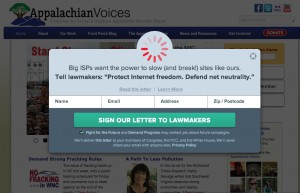If you find yourself staring at spinning wheels on some of your favorite websites today, take a moment to imagine what an unfair Internet would look like.
What if federal regulators currently considering how to regulate the Internet put your favorite small businesses or advocacy groups at even more of a disadvantage? That scary prospect is essentially what the Federal Communications Commission is considering right now.
Today’s Internet Slowdown is an effort to raise awareness around a policy known as “net neutrality.” The general idea behind net neutrality is that no individual website’s content should be prioritized above others’. So, as this NPR piece puts it, “a user can go where he wants and do what he wants on the Internet without the interference of his broadband provider.”
If that basic, but threatened, fairness sounds like something you support, you’re not alone. The FCC has already received more than one million comments on the issue, the vast majority of which support strict enforcement of net neutrality. Here’s how NPR describes what a positive outcome of this process might look like:
“Advocates for the open Internet are pushing for reclassifying the Internet from Title I to Title II under the Telecommunications Act of 1996. According to the supporters of this measure, it would make the Internet more like a public utility and give the agency more authority to regulate the Web and enforce protections for net neutrality.”
Supporters of net neutrality protections say that without the rules, Internet service providers like Comcast and Time Warner will have economic incentives to charge content providers …”
So where does that put groups like Appalachian Voices, who are stretching dollars thin, using the Internet the best way we know how to create the biggest impact and benefits for the communities where we work? I’d argue it puts us somewhere right near the center of the fight. If an open and fair Internet is not maintained, the near future could hold significant challenges for environmental and advocacy groups of all types, independent journalism, entrepreneurs, and really anyone who uses the web as a resource to learn or communicate about issues close to their heart.
Even worse, while concerned citizens are waiting, watching that spinning “wheel of death,” dirty energy interests would have no problem paying to take the fast lane — increasing their level of influence and ability to drown out our voices.
From our work to grow the nationwide movement to end mountaintop removal to more local efforts to build community support for clean water and put an end to coal ash pollution, the Internet has been essential as an educational and advocacy tool. So today, we’re joining in solidarity with other groups and businesses advocating for keeping the Internet open — the way it was always intended to be.
You can join the “Battle for the Net” and add your name to support a fair Internet here.




Battling with you for a fair Internet
Two thumbs WAY up!